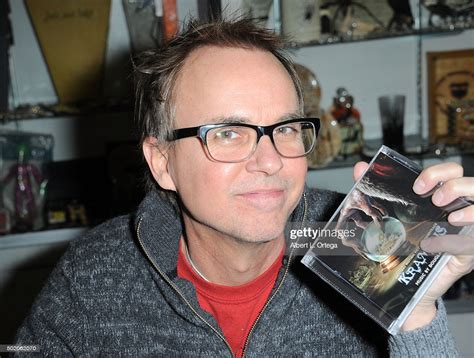A Quote by Clive Barker
I say 'spectacle' rather than 'story' because in the end, it isn't the intricacies of narrative that draw us to horror films. When it's there, I'm grateful for the director's skill at telling an exquisitely nuanced tale filled with psychological insight, but it is the spectacles that I take home with me.
Related Quotes
From a tale one expects a bit of wildness, of exaggeration and dramatic effect. The tale has no inherent concern with decorum, balance or harmony. ... A tale may not display a great deal of structural, psychological, or narrative sophistication, though it might possess all three, but it seldom takes its eye off its primary goal, the creation of a particular emotional state in its reader. Depending on the tale, that state could be wonder, amazement, shock, terror, anger, anxiety, melancholia, or the momentary frisson of horror.
After my film 'The Tale of Two Sisters,' I received a lot of offers from Hollywood to direct, but because 'A Tale of Two Sisters' was a horror film, I received a lot of horror films. But I wasn't interested in working in the same genre, and the scripts I received for films in different genres were for projects that were near completion.
Narrative and metaphysics alike become flimsy and frivolous if they venture too far from the home base of all humanism - the single, simple human life that we all more or less lead, with its crude elementals of nurture and appetite, love and competition, the sunshine of well-being and the inevitable night of death. We each live this tale. Fiction has no reason to be embarrassed about telling the same story again and again, since we all, with infinite variations, experience the same story.
As a horror movie fan, I was very obsessed with horror films. Still am. I love the genre. For me, horror films are opera, and they are... instead of consumption killing off the young lovers, it's Jason Voorhees or Michael Myers. It is when the stakes are at their absolute largest in a story: whether somebody is going to live or die. In a way, it's just holding up a mirror to life.
I have a theory that, for people of color or others who have been cut out of the master narrative, just telling your personal survival tale, your story, is civic engagement. It is a kind of political performance and is really crucial in that storytelling is how the writers connect with people and change. It's how we collect and add to and complicate the master narrative.
That's just me wanting that supernatural tool to tell a story and also not wanting to be restricted by reality, with how we're telling a tale, because we are a heightened reality on Hannibal. There is a larger-than-life quality to the storytelling when it gets into particulars. I like the idea of being able to dismiss reality, depending on if we can sell it as part of the story.
I've been fortunate in that the films I've worked on in the horror genre are themselves not pure horror, and have allowed me to write in a wide variety of styles. Those scores contain elements of fantasy, drama, action, comedy... really all types of scoring, and that gives the horror moments more impact. As for scoring the horror moments, I do like approaching the music from the psychological aspect, scoring to the characters' thoughts, emotions, motivations and such.
One describes a tale best by telling the tale. You see? The way one describes a story, to oneself or to the world, is by telling the story. It is a balancing act and it is a dream. The more accurate the map, the more it resembles the territory. The most accurate map possible would be the territory, and thus would be perfectly accurate and perfectly useless. The tale is the map that is the territory. You must remember this.
I'm obsessed with this idea of storytellers and people who have a narrative, and sometimes sustain a relationship because they're telling a narrative and someone is listening to that. Often the nature of the relationship is determined by how well they tell the story, or someone else's ability to suspend disbelief, or infuse into their narrative something which they may not even be aware of.
It wasn't long after I began writing Star Wars that I realized the story was more than a single film could hold. As the saga of the Skywalkers and Jedi Knights unfolded, I began to see it as a tale that could take at least nine films to tell - three trilogies - and I realized, in making my way through the back story and after story, that I was really setting out to make the middle story.
When I studied with Nicholas Ray he was always telling us, "If you want to make films, watch a lot of films, but don't just watch films, go take a walk, look at the sky, read a book about meteorology, look at the design of people's shoes. Because all of them are part of filmmaking." So I thought, perfect! That's a good job for me.




































